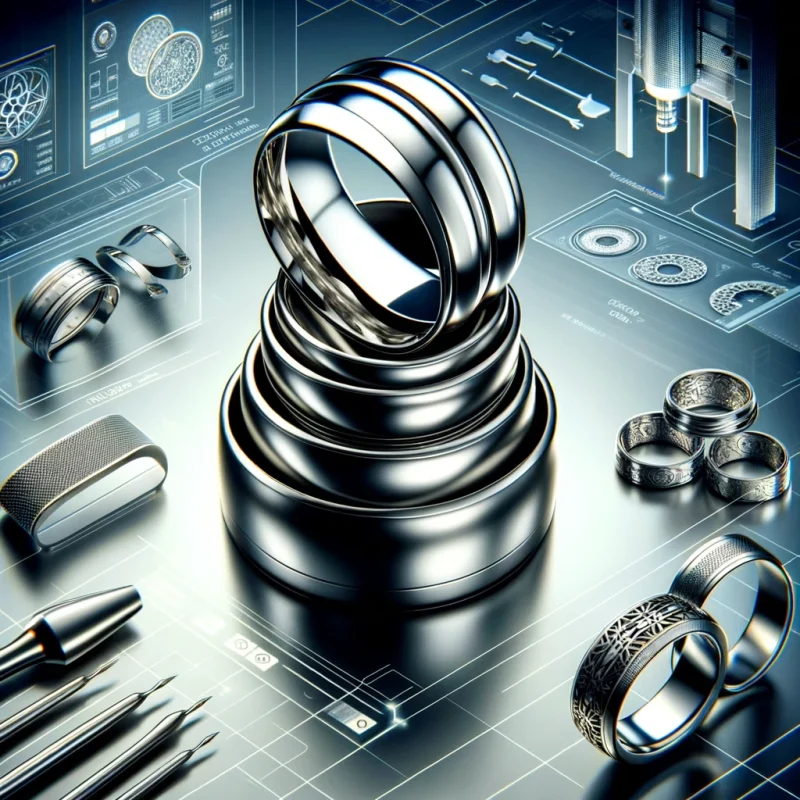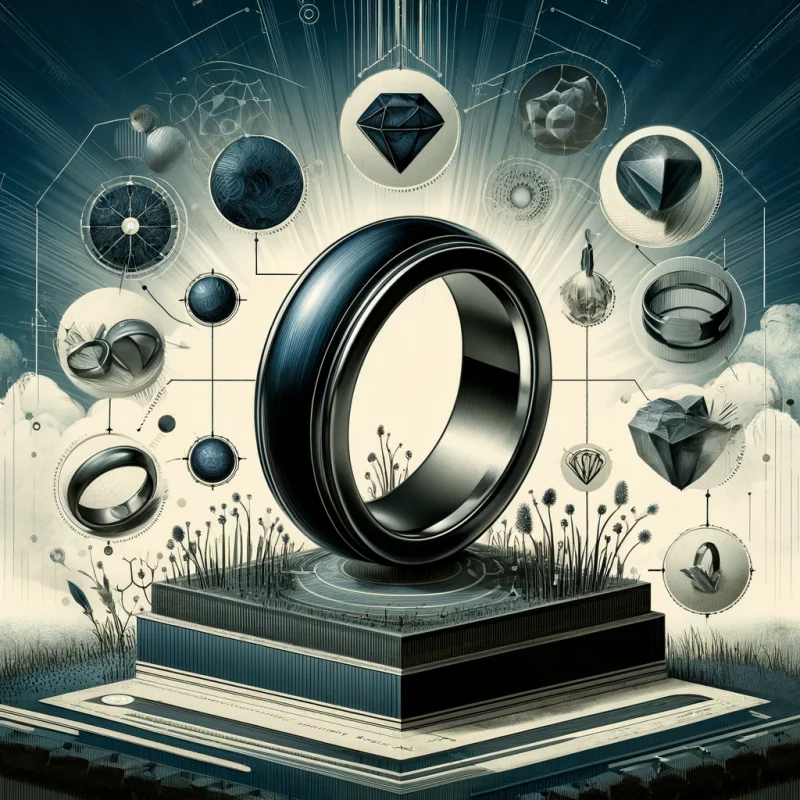Why Choose Forged Carbon Fiber for Custom Rings?
Forged carbon fiber has taken the jewelry world by storm due to its unique properties. It’s lightweight, incredibly durable, and sports a distinctive marbled appearance that’s ideal for anyone seeking something non-traditional yet high-tech. Unlike traditional metals such as gold or platinum, carbon fiber offers a modern aesthetic combined with high-performance strength, often used in aerospace and automotive industries.
One of the best parts about forged carbon fiber is how customizable it is. Here’s how you can design a one-of-a-kind ring that’s as functional as it is stylish.
What Customization Options Are Available?
- Material Pairings: One way to make your forged carbon fiber ring unique is by pairing it with other materials. For example:
- Metals like titanium, tungsten, or gold: These can be used as inlays or accents, creating a contrast between the black carbon fiber and metallic shine.Wood or other organic materials: A forged carbon fiber ring with a wood sleeve or inlay brings a rustic charm while maintaining a modern, durable exterior.
- Texturing and Finish: Forged carbon fiber rings can be finished in various ways to achieve different textures:
- Matte finish: For a subtle, sleek look.
- Polished finish: To give it a high-gloss, reflective surface.
- Textured or faceted surface: To create depth and a unique tactile feel.
- Color Accents: While carbon fiber is typically black, it can be accented with colored metals such as rose gold or anodized titanium. These bright, colorful elements contrast beautifully with the dark marbled pattern of the carbon fiber. Additionally, some manufacturers offer colored carbon fibers that can be incorporated into the ring design. These subtle hints of color give your ring a personal touch, making it truly unique.
How Does Customization Impact Performance?
Customizing a forged carbon fiber ring doesn’t just enhance its appearance—it can also improve its performance. Here’s why:
- Lightweight and Durable: Carbon fiber is known for its exceptional strength-to-weight ratio. Even when combined with other materials like titanium or wood, the ring remains lightweight and resilient.
- Scratch Resistance: The forged carbon process gives the material superior hardness, making it resistant to scratches and everyday wear. This ensures your custom design remains pristine over time.
- Hypoallergenic Properties: For those with sensitive skin, carbon fiber is hypoallergenic, which makes it a perfect alternative to metals that may cause irritation, like nickel.
Why Customize with Forged Carbon Fiber?
Whether you want a minimalist design or something extravagant, forged carbon fiber is incredibly versatile. Its distinct marbled look, combined with various materials and finishes, creates endless customization possibilities.
By blending modern technology with personal flair, you can craft a ring that not only stands out but also offers unparalleled strength and comfort.
The Crafting Process: Precision Meets Art
The beauty of forged carbon fiber rings lies in the manufacturing process, which allows for a highly customizable final product. Here’s a brief breakdown of how these rings are crafted, showcasing the flexibility in design:
Step 1: Shredding the Carbon Fiber
Forged carbon fiber begins as sheets of woven carbon fiber, which are shredded into tiny fibers. These shredded fibers are essential for creating the distinctive marbled appearance that sets forged carbon fiber apart from traditional woven carbon. The irregular structure of the material adds to its charm, ensuring that no two rings are exactly alike.
Step 2: Compression Molding
The shredded fibers are then placed into a custom mold where they are compressed under extreme pressure. During this step, an epoxy resin is infused to bind the carbon fibers, forming a solid and incredibly strong ring base. This molding process is what gives forged carbon fiber its signature strength and resilience. You can shape the mold to create various ring sizes, widths, and thicknesses, allowing for substantial customization.
Step 3: Heat Treatment
Once the ring has been molded, it undergoes a precise heat treatment process. The ring is “baked” in a kiln, which hardens the material. This step ensures that the ring has the durability to withstand everyday wear while maintaining its lightweight feel.
Popular Custom Design Options
Now that we understand the basic process, let’s explore some popular customization options that customers often choose when designing forged carbon fiber rings:
1. Metal Inlays
One of the most requested customizations is the addition of metal inlays, such as:
- Rose Gold: Adds a soft, romantic hue that contrasts beautifully with the black carbon fiber.
- White Gold or Platinum: Ideal for a clean, modern look.
- Tungsten or Titanium: Provides a rugged, industrial feel, perfect for someone who wants a bold, masculine ring.
These inlays can be placed along the center or edges of the ring, adding visual contrast without compromising the ring’s strength.
2. Exotic Wood Combinations
For those who want a blend of the natural and the modern, adding a wooden inlay to the carbon fiber ring offers a unique contrast. Some popular wood choices include:
- Maple or Walnut: To add warmth and a touch of the outdoors.
- Ebony: For a dark, sleek look that complements the black carbon fiber.
- Burl wood: Known for its intricate patterns and knots, adding a rustic but high-end finish.
These combinations allow you to mix organic textures with the futuristic aesthetic of carbon fiber, creating a ring that truly stands out.
3. Stone or Gemstone Settings
For customers looking for a little more luxury in their design, adding gemstones like diamonds or sapphires can elevate the ring’s appeal. The deep black base of the carbon fiber makes these stones really pop, offering a striking contrast. You can also set the stones into the carbon fiber itself or alongside a metal inlay, allowing for versatile design choices.
Popular gemstone settings include:
- Single stones: Centered for an understated yet elegant design.
- Pavé settings: To add a little more bling with a line of smaller stones.
Why Forged Carbon Fiber Is Ideal for Active Lifestyles
One of the best reasons to customize a forged carbon fiber ring is that it’s not just about aesthetics—it’s also about performance. Here’s why this material is a top choice for people who lead active or hands-on lifestyles:
- Lightweight Comfort:
Forged carbon fiber rings are up to three times lighter than titanium and significantly lighter than traditional metals like gold or platinum. This means you get a durable, robust ring that’s also comfortable to wear every day without feeling weighed down. - Durability and Scratch Resistance:
Carbon fiber is highly resistant to scratches and dents, making it ideal for individuals who work with their hands or engage in activities that might damage other types of rings. The compression molding process ensures that the ring remains resilient, even under stress. - Waterproof and Hypoallergenic:
Unlike metal rings that may corrode or cause allergic reactions, forged carbon fiber is completely waterproof and hypoallergenic. It won’t rust or irritate sensitive skin, making it the perfect material for anyone who may have metal allergies.
The Future of Forged Carbon Fiber Jewelry
As carbon fiber technology continues to evolve, so do the possibilities for customization. With the growing popularity of this high-tech material, you can expect to see even more creative combinations, such as carbon fiber mixed with rare metals, ceramics, or even new colored resins.
Customization trends are also leaning toward personal engravings, offering clients the ability to add a personal message or design etched directly into the carbon fiber surface. The result is a ring that not only serves as a symbol of commitment but also as a statement of personal style.
Forged Carbon Fiber vs. Traditional Metals: What Sets It Apart?
While forged carbon fiber rings have become increasingly popular, you may wonder how they measure up against more traditional materials like gold, titanium, and stainless steel. Here’s how forged carbon fiber differentiates itself from conventional options:
1. Weight Advantage
One of the biggest advantages of forged carbon fiber is its lightness. While materials like gold and tungsten are dense and heavy, carbon fiber is so light that many people forget they’re even wearing a ring. This lightweight feature makes it especially appealing for those who value comfort without sacrificing durability.
- Gold: Heavier and more prone to scratching, especially in its purer forms.
- Titanium: Lightweight but still heavier than carbon fiber and lacks the same customizable patterns.
2. Durability and Scratch Resistance
While gold and platinum may offer luxury, forged carbon fiber wins in the scratch resistance category. It’s highly resilient to dents, scratches, and everyday wear and tear, which is why it’s widely used in industries like aerospace and automotive manufacturing. Whether you’re working a hands-on job or engaging in outdoor activities, a forged carbon fiber ring will maintain its polished look for a longer time.
- Gold & Silver: Soft metals that can easily be scratched or dented.
- Titanium: Strong but can still be scratched with regular wear, unlike forged carbon fiber.
3. Unique Aesthetics
The random, marbled appearance of forged carbon fiber sets it apart from the uniformity of metals like gold or silver. Every forged carbon fiber ring is unique, with its distinct pattern created during the molding process. This adds a bespoke, almost artistic quality to each piece, making it the go-to choice for anyone looking to step away from the traditional look.
- Gold & Platinum: Luxurious but uniform in appearance.
- Stainless Steel: Sleek but doesn’t offer the same unique, one-of-a-kind designs.
Long-Term Benefits of a Forged Carbon Fiber Ring
While the initial attraction to forged carbon fiber might be its sleek, modern look, the long-term benefits extend well beyond aesthetics. Here are a few practical reasons why choosing a forged carbon fiber ring is a smart investment:
1. Low Maintenance
Forged carbon fiber requires minimal upkeep. Unlike metals that tarnish over time or need polishing, carbon fiber rings can simply be cleaned with warm water and mild soap. They won’t rust, corrode, or lose their shine, even after years of wear.
For those looking for a low-maintenance option, this makes carbon fiber a clear winner.
2. Hypoallergenic Properties
Another long-term benefit is that forged carbon fiber is hypoallergenic. If you have sensitive skin or allergies to metals like nickel, carbon fiber is a safe alternative that won’t cause irritation. This makes it an ideal material for people who experience discomfort with traditional metals.
3. Cost-Effectiveness
Despite its cutting-edge appeal and performance, forged carbon fiber is often more affordable than precious metals. While prices can range depending on customization options, carbon fiber rings typically offer a cost-effective solution for anyone looking for a high-performance, stylish ring without the hefty price tag of gold or platinum.
Pushing Boundaries: Innovative Trends in Custom Forged Carbon Fiber Jewelry
As 3D printing and carbon fiber technology evolve, the future of custom jewelry is leaning heavily toward even more creative uses of this material. With innovations such as laser-engraving, multi-layered carbon composites, and new resin infusions, expect to see more intricate patterns and bolder designs in carbon fiber jewelry.
Designers are also experimenting with colored resins and composite materials that allow customers to introduce more vibrant hues into their carbon fiber rings, offering even greater customization. From personal engravings to colored accents, the potential to make a ring that perfectly matches your personality is expanding.


